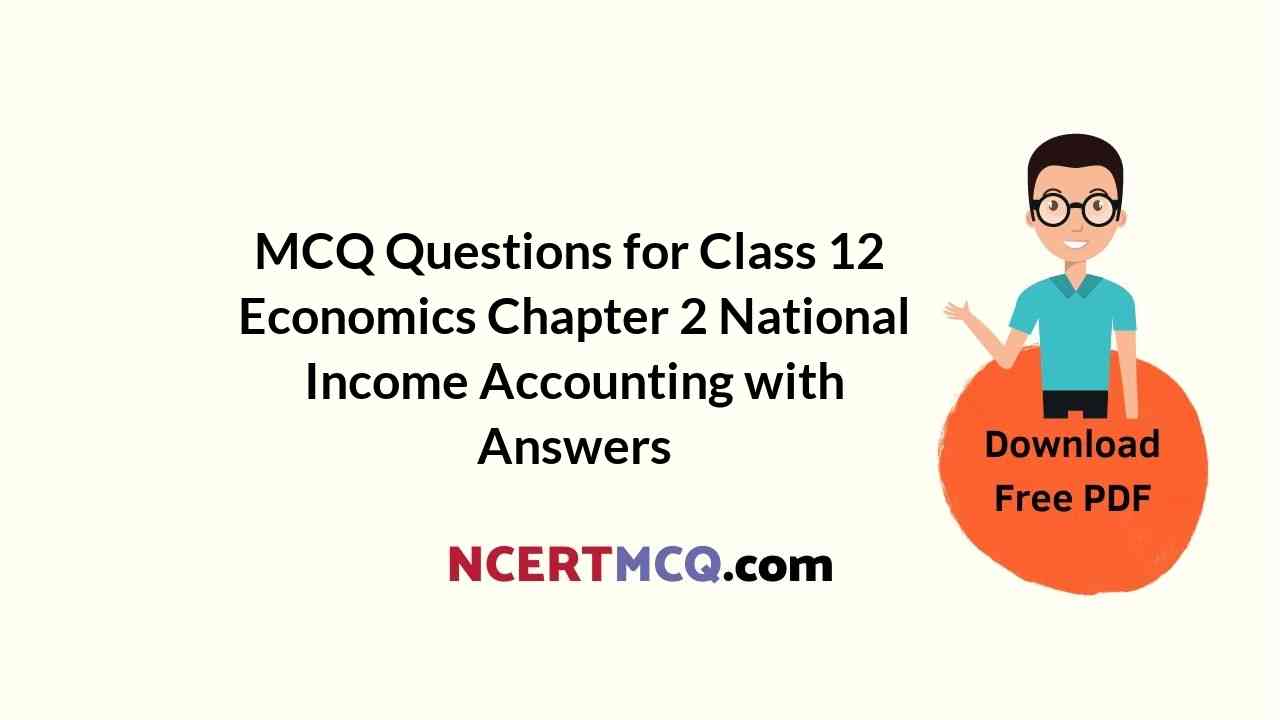Check the below NCERT MCQ Questions for Class 12 Economics Chapter 2 National Income Accounting with Answers Pdf free download. MCQ Questions for Class 12 Economics with Answers were prepared based on the latest exam pattern. We have provided National Income Accounting Class 12 Economics MCQs Questions with Answers to help students understand the concept very well.
Class 12 Economics Chapter 2 National Income Accounting MCQ With Answers
Economics Class 12 Chapter 2 MCQs On National Income Accounting
National Income MCQ Chapter 2 Class 12 Question 1.
GNP at MP = ______
(A) GDPMP – Depreciation
(B) GDPMP + Depreciation
(C) GDPMP ÷ Depreciation
(D) GDPMP + Net factor income from abroad
Answer
Answer: (A) GDPMP – Depreciation
MCQ On National Income Chapter 2 Class 12 Question 2.
NDPMP = ________
(A) GDPMP – Depreciation
(B) GDPFC + Net factor income from abroad
(C) NNPFC + Net indirect taxes
(D) All of these
Answer
Answer: (A) GDPMP – Depreciation
MCQs On National Income Chapter 2 Class 12 Question 3.
NNPMP = ________
(A) GNPMP – Depreciation
(B) NDPMP + Net factor income from abroad
(C) NNPFC + Net indirect taxes
(D) All of these
Answer
Answer: (D) All of these
MCQ On National Income Class 12 Chapter 2 Question 4.
GDPFC =
(A) GDPMP – Net indirect taxes
(B) GDPMP + Net indirect taxes
(C) GDPMP + Subsidies
(D) GDPMP – Indirect taxes
Answer
Answer: (A) GDPMP – Net indirect taxes
MCQ On National Income Pdf Chapter 2 Class 12 Question 5.
NDPFC =
(A) GDPFC – Indirect taxes
(B) GDPFC – Depreciation
(C) GDPFC + Economic subsidy
(D) All of these
Answer
Answer: (B) GDPFC – Depreciation
National Income MCQs Chapter 2 Class 12 Question 6.
NNPFC =
(A) GNPFC – Depreciation
(B) NNPMP + Economic subsidy – Indirect taxes
(C) NDPMP + Net factor income from abroad
(D) All of these
Answer
Answer: (D) All of these
Macroeconomics Class 12 Chapter 2 MCQ Question 7.
Which of the following is the method of measuring National Income?
(A) Income method
(B) Product method
(C) Expenditure method
(D) All of these
Answer
Answer: (D) All of these

National Income Includes MCQ Chapter 2 Class 12 Question 8.
Why are the intermediate goods not included in the National Income while measuring National Income?
(A) To avoid double accounting
(B) It decreases income
(C) Intermediate goods are not good
(D) All of these
Answer
Answer: (A) To avoid double accounting
Question 9.
Who had made the first attempt at National Income Accounting?
(A) Prof. D.R.Gadgill
(B) Simon Kuznets
(C) J.M.Keynes
(D) Gregory King
Answer
Answer: (D) Gregory King
Question 10.
Calculation of National Income at Market Prices is known as _________
(A) Money income
(B) Real income
(C) Non-monetary income
(D) None of these
Answer
Answer: (A) Money income
Question 11.
Accounting of National Income at constant prices is known as ________
(A) Money income
(B) Real income
(C) Current income
(D) Domestic income
Answer
Answer: (B) Real income
Question 12.
Which of the following items are excluded from GNP measurement?
(A) Purely financial transactions
(B) Transfer of used goods and non-market goods and services
(C) Illegal activities and the value of leisure
(D) All of these
Answer
Answer: (D) All of these
Question 13.
The subject of the Study of Macro Economics is:
(a) The Principle of National Income
(b) The Principle of Consumer
(c) The Principle of Producer
(d) None of these
Answer
Answer: (a) The Principle of National Income
Question 14.
Macro Economics Studies:
(a) Employment opportunities in the economy
(b) Theory of supply of Commodities
(c) Elasticity of demand in Scooter
(d) Price of wheat in the market
Answer
Answer: (a) Employment opportunities in the economy
Question 15.
General Price Level is studied in:
(a) Micro Economics
(b) Macro Economics
(c) Both (a) and (b)
(d) None of these
Answer
Answer: (b) Macro Economics
Question 16.
Employment Theory is related to :
(a) Static Economics
(b) Micro Economics
(c) Macro Economics
(d) None of these
Answer
Answer: (c) Macro Economics
Question 17.
Increase in Stock of Capital is known as:
(a) Capital Loss
(b) Capital Profit
(c) Capital Formation
(d) None of these
Answer
Answer: (c) Capital Formation
Question 18.
Which of the following is sPktock ?
(a) Wealth
(b) Saving
(c) Export
(d) Profit
Answer
Answer: (a) Wealth
Question 19.
Which one of the following is included in circular flow?
(a) Real Flow
(b) Money Flow
(c) Both (a) and (b)
(d) None of these
Answer
Answer: (c) Both (a) and (b)
Question 20.
Which one of the following is included in ‘Stock’?
(a) Quantity of Money
(b) Wealth
(c) Quantity of wheat stored in a warehouse
(d) All the above
Answer
Answer: (d) All the above
Question 21.
Which one is included inflow ?
(a) Consumption
(b) Investment
(c) Income
(d) All of these
Answer
Answer: (b) Investment
Question 22.
Which of the following is included in real flow?
(a) Flow of Goods
(b) Flow of Services
(c) Both (a) and (b)
(d) None of these
Answer
Answer: (c) Both (a) and (b)
Question 23.
Which services are provided by families to a firm?
(a) Land
(b) Labour
(c) Capital and Enterprises
(d) All the above
Answer
Answer: (d) All the above
Question 24.
Which one is included in the three-sector model?
(a) Family
(b) Firm
(c) Government
(d) All of these
Answer
Answer: (d) All of these
Question 25.
Which one is included in the four-sector model?
(a) Family, Firm, Industry
(b) Family, Firm, Government
(c) Family, Firm, Government, Foreign Sector
(d) None of the above
Answer
Answer: (c) Family, Firm, Government, Foreign Sector
Question 26.
Which is the equilibrium condition of circular flow in the four sector model?
(a) C + I
(b) C + I + G
(c) C + I + G + (X-M)
(d) None of these
Answer
Answer: (c) C + I + G + (X-M)
Question 27.
The primary sector includes:
(a) Agriculture
(b) Retail trading
(c) Small Industries
(d) All the these
Answer
Answer: (d) All the these
Question 28.
For a four sector or open economy the condition for equilibrium is:
(a) Savings + taxes + Imports = Investment + govt, expenditure + exports
(b) Total Leakages = Total Injections
(c) Aggregate output = Aggregate Expenditure
(d) All of these
Answer
Answer: (d) All of these
Question 29.
Which service is included in Tertiary Sector?
(a) Mining
(b) Construction
(c) Communication
(d) Animal Husbandry
Answer
Answer: (c) Communication
Question 30.
Which of the following is not flow?
(a) Capital
(b) Income
(c) Investment
(d) Depreciation
Answer
Answer: (a) Capital
Question 31.
The market price of all final goods of a country in a year is known as:
(a) GDPMP
(b) GDPFC
(c) NNPFC
(d) None of these
Answer
Answer: (a) GDPMP
Question 32.
Which one is true?
(a) GNP = GDP + Depreciation
(b) NNP = GNP + Depreciation
(c) NNP = GNP – Depreciation
(d) GNP = NNP – Depreciation
Answer
Answer: (c) NNP = GNP – Depreciation
Question 33.
GNPMp =?
(a) GDPMp – Depreciation
(b) GDPMp + Net Factor Income from Abroad
(c) GNPMp + Subsidy
(d) None of the above
Answer
Answer: (b) GDPMp + Net Factor Income from Abroad
Question 34.
NNPMP = ?
(a) GNPMp – Depreciation
(b) GNPMp + Depreciation
(c) GNPMp + Indirect Tax
(d) None of the above
Answer
Answer: (a) GNPMp – Depreciation
Question 35.
Depreciation expenses are included in:
(a) GNPMp
(b) NNPMp
(c) NNPFC
(d) None of these
Answer
Answer: (a) GNPMp
Question 36.
NDPFC = ?
(a) NDPMP – Indirect Tax
(b) GNPMP – Indirect Tax + Subsidy
(c) NDPMP – Subsidy
(d) NDPMF – Depreciation
Answer
Answer: (b) GNPMP – Indirect Tax + Subsidy
Question 37.
Net National Income at Factor Cost is called?
(a) National Income
(b) Gross Investment
(c) Domestic Income
(d) None of these
Answer
Answer: (a) National Income
Question 38.
Which one is included in National Income?
(a) Rent, Wage, Interest
(b) Rent, Wage, Salary
(c) Rent, Profit, Interest
(d) Rent, Wage, Salary, Interest, Profit
Answer
Answer: (d) Rent, Wage, Salary, Interest, Profit
Question 39.
What is the consumption of fixed capital called?
(a) Capital formation
(b) Depreciation
(c) Investment
(d) All of these
Answer
Answer: (b) Depreciation
Question 40.
Which of the following is correct?
(a) Disposable Income = Personal Income – Direct Taxes
(b) Disposable Income = Private Income – Direct Taxes
(c) Disposable Income = Personal Income – Indirect Taxes
(d) Disposable Income = Private Income – Indirect Taxes
Answer
Answer: (a) Disposable Income = Personal Income – Direct Taxes
Question 41.
If for a country net factor income from abroad is negative then:
(a) GDP < GNP
(b) GDP > GNP
(c) GDP ≥ GNP
(d) GDP = GNP
Answer
Answer: (b) GDP > GNP
Question 42.
The market value of all final goods and services produced in an economy over a year is called :
(a) Gross National Product
(b) National Income
(c) Gross Domestic Product
(d) Net National Product
Answer
Answer: (c) Gross Domestic Product
Question 43.
Which method is adopted in measuring National Income?
(a) Production Method
(b) Income Method
(c) Expenditure Method
(d) All of these
Answer
Answer: (d) All of these
Question 44.
Which sector is included in an economy?
(a) Primary
(b) Secondary
(c) Tertiary
(d) All of these
Answer
Answer: (d) All of these
Question 45.
Which of the following is not included in the calculation of Gross National Product?
(a) Purchase and Sale of Old commodities
(b) Intermediate Commodities
(c) (a) and (b) both
(d) None of the above
Answer
Answer: (c) (a) and (b) both
Question 46.
Which one of the following services are included in the Secondary Sector?
(a) Insurance
(b) Manufacturing
(c) Trade
(d) Banking
Answer
Answer: (b) Manufacturing
Question 47.
Which one is included in Primary Sector?
(a) Land
(b) Forest
(c) Mining
(d) All these
Answer
Answer: (d) All these
Question 48.
To include the value of goods or services more than one time while calculating National Income is called :
(a) Single Counting
(b) Double Counting
(c) Multiple Counting
(d) None of these
Answer
Answer: (b) Double Counting
Question 49.
Which one is a component of profit?
(a) Dividend
(b) Undistributed Profit
(c) Corporate Profit Tax
(d) All of these
Answer
Answer: (d) All of these
Question 50.
Which one is included in National Income?
(a) Transfer Earnings
(b) Sale proceeds of Shares and Bonds
(c) Black Money
(d) None of the Above
Answer
Answer: (d) None of the Above
Question 51.
Which one is included in the calculation of National Income?
(a) New Final Goods and Services
(b) Earned Income of Indian Companies in Abroad
(c) Expenses made by Foreign Tourists in the country
(d) All the above
Answer
Answer: (d) All the above
Question 52.
Which one is the limitation of Macro Economics?
(a) Collective Economic Paradox
(b) Ignores Individual Units
(c) Both (a) and (b)
(d) None of these
Answer
Answer: (c) Both (a) and (b)

Question 53.
Macro-economics is the study of:
(a) Principle or Theories of national income
(b) Consumer’s theory
(c) Production theory
(d) None of these.
Answer
Answer: (a) Principle or Theories of national income
Question 54.
Out of the following which is not a flow:
(a) Capital
(b) Income
(c) Investment
(d) Depreciation.
Answer
Answer: (a) Capital
Question 55.
From the following which method is used for measuring national income:
(a) Production method
(b) Income method
(c) Expenditure method
(d) All of the above.
Answer
Answer: (d) All of the above.
Question 56.
Which of the following is included in the primary sector:
(a) Land
(b) Forest
(c) Mines
(d) All of the above.
Answer
Answer: (d) All of the above
Question 57.
Total national income divided by total population is known as:
(a) Private income
(b) Personal income
(c) Personal spendable income
(d) Per capita income.
Answer
Answer: (d) Per capita income
Question 58.
Production enterprises are divided in:
(a) Two sectors
(b) Three sectors
(c) Four sectors
(d) Five sectors.
Answer
Answer: (b) Three sectors
Fill in the blanks:
Question 1.
________ income is the value of current income at base-year prices.
Answer
Answer: Real
Question 2.
__________ flow shows flow of goods and services across different sectors.
Answer
Answer: Real
Question 3.
_______ sector is also known as the service sector.
Answer
Answer: Tertiary
Question 4.
_________ is an economic variable that is measured over a specific period of time. It is a dynamic concept.
Answer
Answer: Flow
Question 5.
________ is the loss of value of fixed assets due to normal wear and tear.
Answer
Answer: Depreciation
Question 6.
Environmental pollution caused by industries is a _______ externality.
Answer
Answer: negative
Question 7.
_______ are the economic assistance given by the government for the general welfare.
Answer
Answer: Subsidies
Question 8.
Investment refers to addition to the ________ of an economy. For example purchase of machinery, construction of the metro.
Answer
Answer: capital stock
Question 9.
Nominal GDP is the value of GDP at _______ prices.
Answer
Answer: current
Question 10.
________ means estimating the value of goods and services more than once.
Answer
Answer: Double counting
Question 11.
Agriculture is included in the…………… sector.
Answer
Answer: Primary
Question 12.
Pigou has divided welfare into ………….. parts.
Answer
Answer: Two
Question 13.
Chinese product is included in …………… area of the economy.
Answer
Answer: Secondary
Question 14.
National income in India is calculated by………………
Answer
Answer: Central statistical organisation
Question 15.
The total value of all final goods and services produced within the domestic territory of a country during an accounting year is known as ……….
Answer
Answer: GDP
Question 16.
……….. is an index of economic development of the country.
Answer
Answer: National income.
State true or false:
Question 1.
As compared to developed countries, India’s per capita income is quite less.
Answer
Answer: True
Question 2.
Black money has given birth to a parallel economy in the country.
Answer
Answer: True
Question 3.
The major contribution to India’s national income is from the secondary sector.
Answer
Answer: False
Question 4.
Electricity, LPG, and water supply are included in the primary sector.
Answer
Answer: False
Question 5.
Income from gifts is included in the national income.
Answer
Answer: False
Question 6.
The sale of second-hand goods is not included in the national income.
Answer
Answer: True
Match the following:
Question 1.
| ‘A’ | ‘B’ |
| 1. Fish culture | (a) Tertiary sector |
| 2. Highest contribution in national income | (b) Year 1952 |
| 3. National income committee was established in | (c) Mixed method |
| 4. National income calculation is done by | (d) Year 1949 |
| 5. Establishment of C.S.O. | (e) Primary sector. |
Answer
Answer:
| ‘A’ | ‘B’ |
| 1. Fish culture | (e) Primary sector. |
| 2. Highest contribution in national income | (a) Tertiary sector |
| 3. National income committee was established in | (d) Year 1949 |
| 4. National income calculation is done by | (c) Mixed method |
| 5. Establishment of C.S.O. | (b) Year 1952 |
Question 2.
| Column-I | Column-II |
| 1. Real flow | (A) Imports, savings, etc. |
| 2. Money flow | (B) Exports, investments, etc. |
| 3. Examples of injections | (C) Balance in the bank account as of January 1st, 2019 |
| 4. Examples of leakages | (D) Income per Month |
| 5. Examples of stock | (E) Income from a self-employed person |
| 6. Examples of flow | (F) GNP at constant prices |
| 7. GDPMP | (G) The flow of goods and sen/ices |
| 8. Mixed-income | (H) GDPFC + NIT – Subsidies |
| 9. Change in the stock | (I) Depreciation |
| 10. Nominal GNP | (J) The flow of money across different sectors |
| 11. Real GNP | (K) Closing stock – opening stock |
| 12. Consumption1 of fixed capital | (L) GNP at current prices |
Answer
Answer:
| Column-I | Column-II |
| 1. Real flow | (G) The flow of goods and sen/ices |
| 2. Money flow | (J) The flow of money across different sectors |
| 3. Examples of injections | (B) Exports, investments, etc. |
| 4. Examples of leakages | (A) Imports, savings, etc. |
| 5. Examples of stock | (C) Balance in the bank account as of January 1st, 2019 |
| 6. Examples of flow | (D) Income per Month |
| 7. GDPMP | (H) GDPFC + NIT – Subsidies |
| 8. Mixed-income | (E) Income from a self-employed person |
| 9. Change in the stock | (K) Closing stock – opening stock |
| 10. Nominal GNP | (L) GNP at current prices |
| 11. Real GNP | (F) GNP at constant prices |
| 12. Consumption1 of fixed capital | (I) Depreciation |
We hope the given NCERT MCQ Questions for Class 12 Economics Chapter 2 National Income Accounting with Answers Pdf free download will help you. If you have any queries regarding CBSE Class 12 Economics National Income Accounting MCQs Multiple Choice Questions with Answers, drop a comment below and we will get back to you soon.
Class 12 Macroeconomics with Answers MCQ:
